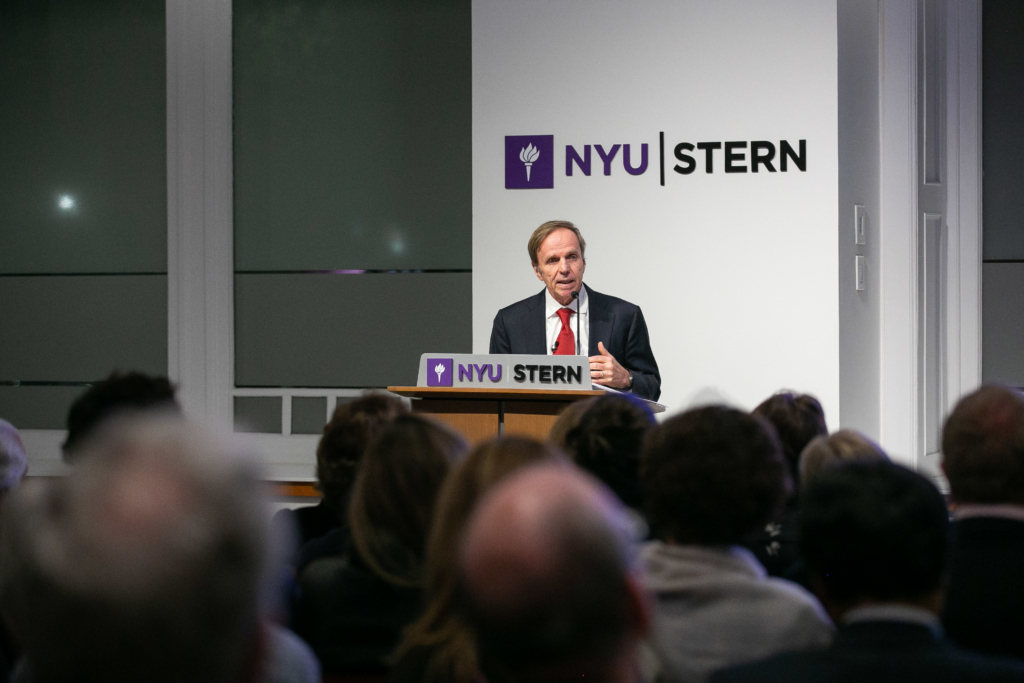
‘If the notion is that business schools ought to be preparing future business leaders, there’s no doubt that business leaders are going to be called on to address these questions. I view this as an opportunity for business schools to provide what the business community wants and needs,’ says Mike Posner, founder of Stern’s Center for Business and Human Rights.
Do you find interest in ESG issues is increasing? Or what can you say about interest over the last decade or so?
I’d say a couple of things. First of all, ESG has only really been around for about 15 years. I don’t quite know how they put the ‘E’ and the ‘S’ and the ‘G’ together, but traditional concerns about governance have been going on for a long time. Huge interest in the environment and especially in climate change, and that’s where there’s been a lot of growth. The ‘S,’ the social — which to our minds needs to include labor and human rights issues — has been left behind. There’s a lot of money now pouring into ESG funds; I think it’s $20 trillion. Goldman Sachs, BlackRock, everybody’s got an ESG fund or two, but they are really ‘E’ and ‘G’ funds, and the ‘S’ is all over the place. So we’re very focused on one, calling out the gaps in the ‘S’, and two, trying to figure out frameworks that makes sense.
Explain a bit more about what the Center is working on right now.
There are two aspects to what we do. We are, in the first instance, radiologists. We do X-rays of industries, evaluate the challenges and look at how it relates to business models. We’re much more interested in how companies make money as opposed to how they give it away. In the second instance, we’re not just diagnosing the problem, we’re making recommendations to address it and then trying to work with companies to do that.
To give you an example, we’ve done a lot of work with the apparel industry, and we came up with 13 metrics for better purchasing practices. The relationship between buyers and suppliers is key to improvement on human rights. If a company, a big global buyer, is not consulting with their suppliers about the design of a product, that’s going to cause problems. If they’re changing the order last minute, it’s going to add costs. If they’re not compensating their suppliers adequately, that’s going to add pressure for the suppliers to cut down the margins. Buyers have so much leverage that when they make demands on their local business partners, it causes those business partners to cut corners in order to make a living and that results in long hours and insufficient pay for the workers. We have spent the last couple of years trying to get companies to actually embrace this model and test it. It’s a challenge, but that’s what we do. We keep trying to come up with very practical ways for companies to do work differently, and then try to push them to do it. Sometimes we succeed and sometimes we don’t.
What’s something emerging from the center of which you are particularly proud?
You know, we were the first business school to tackle this subject, and our notion always was that we’re not going to succeed if it’s just one school. There needs to be multiple schools raising these issues in different ways. With a colleague in Geneva, who’s now started the Geneva Center for Business and Human Rights at the Geneva School for Economics and Management at Geneva University, we’ve begun to act like missionaries proselytizing: This is something you too can do. We’re now working with a group called the Global Business School Network which is a collection of about 120 business schools around the world. I think we had 60 schools that came to the meeting last month, and we have seven different work streams. One group is looking at gender and human rights, another one is looking at supply chains, and so forth, and each of those groups are now working together. So there may not be a full center at every school, but there’s an awful lot of energy.
Do you feel that momentum on these issues is building on the business side?
Yes. I would say in every industry where we’re working, there are leaders who have taken the leap to say, ‘We actually have to figure this out and get ahead of the curve.’ Does that mean that everybody in the industry is doing it? No. Does it mean that there isn’t still anxiety about getting out front? There’s always anxiety about committing resources, time and energy to something that might be risky publicly when your competitors are sitting and hiding under the table. But I would say in every area we’re working, we’ve identified good companies that are aligned with what we’re trying to do. The challenge for us, and for them, is to come up with an industry approach — industry standards and metrics — where you get a number of competitors sitting around a table saying these are things we need to do. Essentially creating a leadership model that others then feel they have to follow.

New York University’s Stern School of Business
Where does the Center go from here?
First of all, for us, I think the model is right. We’re 10 people focusing on four or five industries, but there are major industries that we haven’t touched at all. We don’t have somebody focusing on mining as a primary focus, although we’ve done some work with cobalt in the production of batteries in the Congo. We haven’t focused on the drug industry, pharmaceuticals, so there are big gaps in what we know are real issues. We just haven’t had the resources. So for us, we want to grow and be available as a resource in all of those industries.
The second thing is to develop more of these multi-stakeholder approaches, so that it’s not just a one off or a company trying to figure out what the best practices are for them. Taking not only an industry-wide approach, but one that engages other stakeholders — local communities, civil society organizations, governments and others — to have a comprehensive approach for each industry.
The third thing would be just to make this a more integrated part of business schools. I don’t expect every business school to have a Center on Human Rights, but I do think there ought to be at least the option at every school to take a course that focuses on human rights, as well as integrating human rights into existing curricula. For example, business schools teach operations. There’s generally a course on supply chains which tends to focus on logistics. That’s totally legitimate. But, I would hope to see that every supply chain course includes a session on the workers in the supply chain and how to protect their rights. I could do that through every area of business education. Certainly within finance, within economics, looking at the ‘S’ in ESG.
Do you see more interest in business schools in this kind of approach?
We’re in conversations all of the time. You need two things: You need deans, the leaders of business schools, to treat this as a priority. So, I make every effort to find the deans and bend their ears. And you need an early adopter on the faculty. It’s not likely that a lot of schools are going to go out and hire a human rights expert to a faculty position. So, you need to find somebody who’s teaching something that touches on this, who has an interest and a willingness to adapt and bring this within the four corners of how the school allocates resources and designates courses.
But I’m encouraged. There’s a lot of interest, and I think we have the wind at our backs. This is the way the world is going. If the notion is that business schools ought to be preparing future business leaders, there’s no doubt that business leaders are going to be called on to address these questions. I view this as an opportunity for business schools to provide what the business community wants and needs.





Questions about this article? Email us or leave a comment below.